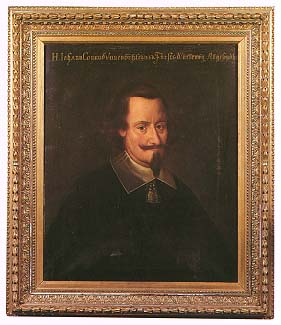To the Welcome
page and Contents list
Biography of
Johann Conrad Varnbüler, 1595-1657
 The
following description draws primarily from the biography of Johann Conrad that
appears in Allgemeine Deutsche Biographie,
Vol. 39, pp. 496-498
The
following description draws primarily from the biography of Johann Conrad that
appears in Allgemeine Deutsche Biographie,
Vol. 39, pp. 496-498
Johann Conrad went
to Tübingen in 1609 and there mastered the general knowledge of humanism, then studied law from 1613 to 1617. For more education he went to Vienna, where he served for a short time as an attorney on the Imperial Court Council. Many
other positions followed, including service to the Duke of Württemberg. In that
service he gained laurels for his service to his sovereign, as well as for his
service to all of Germany. Initially he was a secretary and accompanied the
Württemberg councilors to the negotiations that yielded the League of Heilbronn
in 1633. In response to the request made by Oxenstierna and the other
Confederates, Eberhard III released Johann Conrad to serve as the secretary of
the so-called consilium formatum,
a council set apart to assist the Swedish chancellor. With his family, Johann
Conrad moved to Frankfurt and became an intimate with Sweden, responsible for
regulating Württemberg's affairs with that country.
After the consilium
formatum was disbanded, he found it impossible
to return to Württemberg, because the duke had fled to Strasbourg and the
province was under imperial control. Thus Johann Conrad was busily in the
service of various German potentates, attempting to bring about the restoration
to power of his ruler in Württemberg, who had been banned by the 1635 Treaty of
Prague. When the duke returned in 1638 he appointed Johann Conrad a state
councilor. That Johann Conrad received a house in Württemberg demonstrated that
the duke was grateful to Johann Conrad for his services.
The duke then sent
Johann Conrad to the peace talks that had begun in 1643 in Osnabrück and
Münster, talks aimed at ending the 30-years war. The main goal of Württemberg
at the conference was the restitution of the province's lands and cloister
properties that had been confiscated. Johann Conrad not only worked toward that
goal, but also expanded his activities to that of an intermediary in general.
He was constantly working to hinder the constant threat that the peace talks
would be interrupted. In doing so he gained the confidence of Count
Trattmansdorff, a representative of the emperor. When peace was finally
achieved, Count Palatine Karl Gustav could justifiably write the following to
the duke of Württemberg: "The peace treaty clearly shows the effects of
Varnbüler's cautious efforts on behalf of His Excellency during the Westphalian
Peace negotiations. No other German entity was represented in such clear,
undisputed terms." The full restitution of Württemberg holdings was the result;
it was largely due to Johann Conrad's diplomatic efforts that this was
acheived. Johann Conrad also represented the duke at the Nuremberg
negotiations, where the provisions of the treaty were implemented.
In gratitude for his
services at the negotiations, the duke, in 1649, granted Johann Conrad the
hereditary rights to the knight's estate (the castle, lands, etc.) at Hemmingen
(a small village near Stuttgart). In November, 1650, in Vienna, Emperor
Ferdinand III confirmed his status as an imperial nobleman ("over 400
years as imperial nobility"), including the right to use the coat-of-arms.
Thus he and his descendants could refer to themselves as von und zu
Hemmingen, as if the name and their
properties had been theirs by inheritance. In addition, The Order of Imperial
Knights accepted him into their number (1652) and he was granted the honor of
being named an imperial Count Palatine. In 1652 the duke appointed him a
commissioner in Leonberg County, which was recognized as an extraordinary
honor.
His marriage to
Susanna Beck of Nuremberg produced 6 sons and 5 daughters, of whom 5 sons and 4
daughters survived their father. He died in Stuttgart in 1657.
To the biography of
Nikolaus
To the biography of Ulrich
To the Welcome page and Contents list